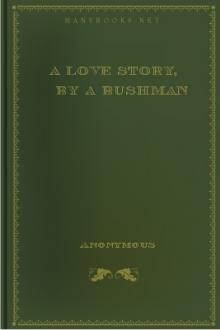A Love Story, by a Bushman, - [books for 8th graders txt] 📗

- Author: -
- Performer: -
Book online «A Love Story, by a Bushman, - [books for 8th graders txt] 📗». Author -
into his arms.
“My son I my son! that should have been. Our angel is gone—gone!”
Delmé tried to speak, but his tongue clove to his mouth, and the hysteric
globe rose to his throat.
Suddenly he heard the sound of wheels, and of heavy footsteps on
the stairs.
He imprinted a kiss on the old woman’s forehead—it was his farewell for
ever!—gave her to the care of the maid servant—and rushed from the room.
He was stopped on the landing of the staircase by the coffin of her he
loved so well. The bearers stopped for an instant; they felt that this was
no common greeting. Part of the pall was already turned back. Delmé
removed its head with trembling hand.
“Julia Vernon. ætate 22.”
He dropped the velvet with a groan, and was only saved from falling by the
timely aid of the old butler, whose face was as sorrowful as his own.
But there was a duty yet to be performed, and Delmé followed the corpse.
The first mourning coach was just drawn up. An intended occupant had
already his foot on the step.
“This place is mine!” said Sir Henry in a hollow voice.
The cortege proceeded; and Delmé, giddy and confused, heard solemn words
spoken over his affianced one, and he waited, till even the coffin could
he discerned no more.
Thompson, who had followed his master, assisted him into his carriage,
placed himself beside him, and ordered the driver to proceed to the hotel.
But Delmé gave a quick impetuous motion of the hand, which the domestic
understood well; and the horses’ heads were turned towards the metropolis.
The mourner tarried not, even to bid his sister farewell; but sought
once more his brother’s grave. Some friendly hand had kept its turf
smooth; no footsteps, save the innocent ones of children, had pressed
its grassy mound. It was clothed with soft daisies and drooping
harebells. The sun seemed to shine on that spot, to bid the wanderer be
contented and at rest.
But as yet there was no rest for Delmé. And he stood beside the marble
slab, beneath which lay Acmé Frascati. The downy moss—soft as
herself—was luxuriating there; and the cry of the cicalas was pleasant
to the ear; and the image of the young Greek girl, as in a vivid
picture, rose to his mind’s eye. She was not attired in her white cymar;
nor was her head wreathed with monumental amaranths;—health was on her
cheek, fond smiles on her pouting lip, and tender love swimming in her
melting glance.
His own griefs came back on Delmé; he groaned aloud. He traversed the
deserts, he crossed lofty mountains, he knew thirst and privations. He was
scoffed at and spat upon in an infidel country—he was tossed on the
ocean—he shook hands with danger.
He visited our wide Oriental possessions; and sojourned amid the spicy
islands of the Indian Archipelago, where vegetation attains a magnificence
unknown elsewhere, and animal life partakes of this unexampled
exuberance,—where flowers of the most exquisite colours and fragrance
charm the senses by day, and delicious plants saturate the air with their
odours by night.
Delmé extended his wanderings to the rarely visited “many isles,” which
stud the vast Pacific, and found that there too were fruitful and
smiling regions.
But not on the desert—nor on the mountains—nor in the land of the
Moslem–nor on tempestuous seas—nor in those verdant islets, which seem
to breathe of Paradise, to greet the wearied traveller; could Delmé‘s
restless spirit find an abiding place, his thirst for foreign travel be
slaked, or his heart know peace.
He madly sought oblivion, which could not be accorded him.
Chapter XVI.
The Wanderer.
“Then I consider’d life in all its forms,
Of vegetables first, next zoophytes,
The tribe that dwells upon the confine strange
‘Twixt plants and fish; some are there from their mouth
Spit out their progeny, and some that breed,
By suckers from their base or tubercles,
Sea-hedgehog, madrepore, sea-ruff, or pad,
Fungus, or sponge, or that gelatinous fish,
That taken from its element at once
Stinks, melts, and dies a fluid; so from these,
Through many a tribe of less equivocal life,
Dividual or insect, up I ranged,
From sentient to percipient, small advance,
Next to intelligent, to rational next,
So to half spiritual human kind,
And what is more, is more than man may know.
Last came the troublesome question—What am I?”
*
“And vain were the hat, the staff, and stole,
And all outward signs were a snare,
Unless the pilgrim’s endanger’d soul
Were inwardly clothed with prayer.
“But the pilgrim prays—and then trials are light—
For prayer to him on his way,
Resembles the pillar of fire by night,
And the guiding cloud by day.
“And salvation’s helm the pilgrim wears,
Or vain were all other dress;
And the shield of faith the pilgrim bears,
With the breastplate of righteousness.
“At length his tears all wiped away;
He enters the City of Light;
And how gladly he changes his gown of grey,
For Zion’s robe of white.”
It was on the 22nd of October, 1836, that an emissary from his sister,
sought Sir Henry Delmé. It was at the antipodes to his ancestral home; in
Australia, that wonderful country, which—belied and calumniated, as she
has hitherto been—presents some anomalous and creditable features.
For her population, she is the wealthiest, the most enterprising, the most
orderly and loyal, of our British possessions. There, is the aristocracy
of wealth, to an unprecedented degree, subservient to the aristocracy of
virtue. While she is stigmatised as the cloacæ of Britain, the philosopher
looks into the future, and already beholds a nation, perpetuating the
language of the brave and free; when the parent stock has perhaps ceased
to be an empire; or is lingering on, like modern Greece, in the hopeless
languor of decay and decrepitude.
This agent had arrived from England, a very short period before; and,
accredited with a packet, containing various communications from Emily and
Clarendon, accompanied by the miniatures of their children, with little
silky curls attached to each, proceeded an expectant guest, to Sir Henry
Delmé‘s temporary residence. Early dawn saw him pacing the deck of a steam
vessel; and regarding with great surprise, the opposite banks of Hunter’s
River, up which the vessel was gliding.
A rich dark soil, of great depth, bespoke uncommon fertility; while the
varieties of the gum tree—then quite new to him—with their bark of every
diversity of colour, gave a primeval grandeur to the scene.
Each moment brought in sight the location of some enterprising settler,
which, ever varying in appearance, in importance, and in extent yet told
the same tale of difficulties overcome, and success ensuing.
On his reaching the township, near the head of the navigation, this agent
found horses waiting for him:—he was addressed by a well-appointed
groom—our old friend Thompson—who touched his hat respectfully, and
mentioned the name, he was already prepared for by his Sydney advices.
Suffice it, that Sir Henry was no longer the Baronet, and that the name of
Delmé was a strange one in his household.
Their route skirted the banks of one of those rivers, which, diverging
from that mine of wealth, the Hunter, wind into the bowels of the land,
like a vein of gold.
That emissary will not soon forget his lovely ride. His eye, wearied with
gazing on the wide expanse of ocean, feasted on the rich and novel
landscape. They rode alternately, through cleared lands, studded with rich
farms, waving with luxuriant crops of wheat and rye; and again, through
regions, where the axe had never resounded, but where eucalypti, and
bastard box, and forest oak with its rough acorn, towered above beauteous
wild flowers, whose forms and varieties were associated in the mind of
the stranger, with some of the most precious and valued flowers which
adorn British conservatories.
The russet Certhia, with outspread fluttering wing, pecked at the smooth
bark, and preying on some destructive insect, really preserved what it
seemed to injure. The larger parrots, travelling in pairs, screamed their
passing salutation, as they displayed their bright plumage to the sun;
while hundreds, of a smaller kind, with crimson shoulder, were concealed
amid the green leaves; and, as they rode beneath them, babbled—like
frolicsome children of the forest—a rude, but to themselves a not
unmeaning dialogue.
The superb warblers, ornaments alike to the bush or the garden, flitted
cheerily from bough to bough. Strangely mated are they! The male, in suit
of black velvet, trimmed with sky blue, looks like a knight, attired for a
palace festival:—while his lady-love—she resembles some peasant girl,
silent and grateful, clothed in modest kirtle of sober brown.
As he reined in his horse, to examine these at leisure, how melodiously
came on his ear, the clear, ceaseless, silver tinkle of the bell-bird;
this sound ever and anon chequered by the bold chock-ee-chock! of the
bald-headed friar. They had proceeded very leisurely, and the sun was
already declining, when Thompson, pointing to an abrupt path, motioned
him to descend, and at the same time, gave the peculiar cry, known in the
colony as the cooï; a cry which was as promptly answered. It was not
until he was close to the edge of the river, that the stranger understood
its purport.
A punt was rapidly approaching from the opposite bank. An athletic
aboriginal native, in an attitude that seemed studiedly graceful, was
bending to the stout rope, which, attached to either side of the river,
served to propel the punt. He had been spearing fish; for his wife, or
gin, or queen—for she was born such, and contradicted in her person the
old adage,
“There’s a difference between
A beggar and a queen”—
was drawing the barb of a spear from the bleeding side of a struggling
mullet. She sat at the bottom of the boat, with a blanket closely wound
round her. She was young, and her looks were not unpleasing. Her
thickly-matted hair was ornamented with kangaroo teeth; and to her
shoulder, closely clung a native tailless bear, whose appearance could not
do otherwise than excite a smile. With convex staring eyes—hairless
nose—and white ruff of fur round his face—he very closely resembled in
physiognomy, some grey-whiskered guzzling citizen. The well-trained horses
gave no trouble, as they entered the punt; and the smiling boatman,
displaying his teeth to Thompson, but without speaking, commenced warping
the punt to the opposite side of the river. They were half way across, ere
the guest observed the mansion of the friend he sought. It stood on the
summit of the hill, on the left; beneath which the river made a very
abrupt bend. The house itself resembled the common weather-boarded cottage
of the early settler,—wide verandah was over the front entrance,—and two
small rooms, the exact width of this, jutted out on either side of it.
Its site however was commanding. The house stood on an eminence, and from
the windows, a long reach of the river was visible. At the top of the brow
of the hill, extended a range of English rose trees, in full flower. The
bank, which might be about thirty yards in front of these, was clothed
with foliage to the water’s edge.
There might be seen the fragrant mimosa—the abundant acacia—the swamp
oak, which would have been styled a fir, had not the first exiles to
Australia found twined round its boughs, the misletoe, with its many home
associations—the elegant cedar—the close-growing mangrove—and strange
parasitical plants, pushing through huge fungi, and clasping with the
remorseless





Comments (0)